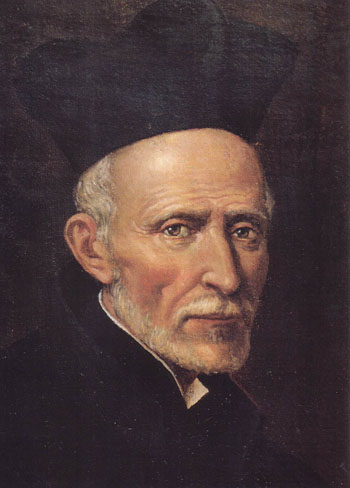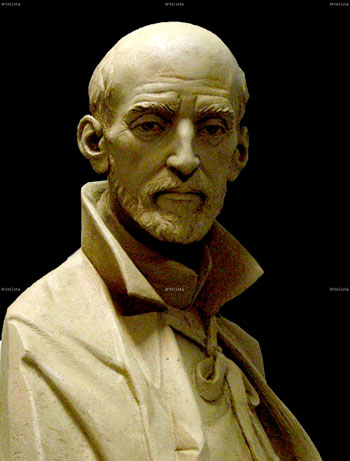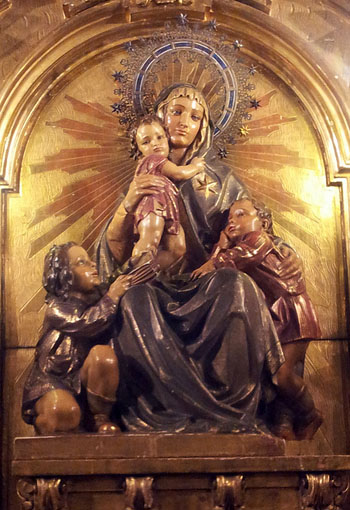 |
The Saint of the Day
St. Joseph Calasanz, August 27
Prof. Plinio Corrêa de Oliveira
Biographical selection:
St. Joseph Calasanz lived from 1557 to 1648. He was born into a noble family at the Castle of Calasanz near Peralta de Calasanz in the Kingdom of Aragon.
He received a formation in law and theology and became a secretary of the Bishop of Lérida.

St. Joseph Calasanz, Founder
of the Order of the Pious Schools |
One day he heard in his soul a mysterious voice telling him: “Leave the land where you were born and go to Rome.”
In 1592, he went to Rome and was taken under the protection of Cardinal Marcoantonio Colonna, who named him his theologian. After a flood of the Tiber in 1598, a great number of people died or became homeless. Calasanz dedicated himself fully to works of charity to help the destitute. In 1600, he opened his first “Pious School” in the center of Rome, which offered free education for poor children. The call for Pious Schools grew, and in 1602 Calasanz laid the foundation of the Order of the Pious Schools or Piarists.
For 41 years he acted as superior with supreme patience and humility. He merited the gift of miracles and the Blessed Virgin appeared to him with the Infant Jesus to bless his Congregation. He had also the gifts of reading consciences and of prophecy.
He worked tirelessly for the propagation of his Order in his visits to other countries across Europe. Later, however, he saw his work collapse and disappear as the fruit of internal discord and external persecution. In 1643, he was expelled from the Order he had founded.
In 1646, the Order was suppressed by the Holy See and its properties and goods were transferred to the authority of the local Bishops. He suffered so much that Our Lord appeared to him to console him and tell him that his Congregation would bloom again in the future.
He died on August 25, 1648, at age 91. A century later his heart and tongue were found intact without a sign of corruption.
Eight years after his death Pope Alexander VII cleared the name of the Pious Schools and restored his work.
Comments of Prof. Plinio:
The Saint received the recommendation from God to leave Spain and go to Rome. He was a man of a noble background with relevance in the Kingdom of Aragon. This man leaves everything and goes to Rome to found a Religious Congregation that Providence desired him to institute. He goes and founds it. But after a period of normal growth, the time comes when, because of internal calumnies and defamations, the Congregation is closed; his work is destroyed.

A sculpture that reflects the trial the Saint
suffered in his last years |
For you to evaluate what this means for the soul of a founder, you should consider that St. Ignatius of Loyola, the incomparable St. Ignatius, was once asked what he would do if the Society of Jesus were dissolved by the Holy See. He made this reply, which illustrates his prodigious strength of spirit: “At the end of 15 minutes of prayer before the Holy Sacrament, I believe I would have recovered my peace of soul.”
Now, St. Ignatius is considered prodigious for just making this reply. But St. Joseph Calasanz lived for years in this situation, to the point that he died seeing his work dissolved. His work ended and his life appeared to be useless. That suppression represented his complete defeat.
The selection does not say this, but it was probably the worst trial of his entire life. He undoubtedly asked himself whether the Congregation was being punished because of his own infidelity. He likely was induced to think that he was guilty for the destruction of the work Providence had called him to accomplish.
This most likely was his supreme trial. Indeed, what man – even if he is a saint – cannot find in his conscience a fault or at least some shadow that can call down divine wrath? Then, his agony of spirit: “What was that infidelity, act of ingratitude or movement of soul that, in final analysis, razed my work?”
His Congregation was falling into ruin; he was there seeing the growing tide of intrigues engulfing it; seeing those who, instead of being his docile disciples, slandered their founder; seeing the devil of discord overtaking his Congregation. Seeing all this and being plagued by that atrocious doubt: “Was it not I who caused this disaster?”
But he had confidence in Divine Providence and maintained peace in his soul. He preserved a peace amidst the sadness of his situation, keeping his eyes on Our Lady and Our Lord Jesus Christ. Doing this, St. Joseph Calasanz could say: Ecce in pace amaritude mea amarissima – Behold in peace is my most bitter bitterness.

Our Lady of the Pious schools in the
Order's house in Valencia |
Elect souls at times are called to pass through trials like this. Ven. Mary of Agreda writes that the fact that the Child Jesus disappeared from St. Joseph’s care – later He would be found in the Temple – represented an enormous trial for Our Lady. She did not know if His absence was caused by some fault on her part.
Adding to this impression was the fact that, in order to test her, He had been cold toward her before He left. So, she could have thought: “What if this happened because of my fault? What if He has become weary of me? I am not worthy of being His Mother, so He acted justly in abandoning me. But now my life has lost its meaning…” Then, you can imagine her joy when she and St. Joseph found Our Lord at the Temple.
St. Joseph Calasanz did not see his Congregation reestablished during his life. However, when he died he heard that invitation Our Lord makes to every just man: “Come, my good and faithful servant and enter into the glory of your Lord.” Then, and only then, he understood that the failure was not his fault. From Heaven he saw his Congregation re-structured again. Actually, it was reborn and became a great work throughout the world.
But, today, with the crisis that is afflicting all the religious Orders and Congregations, what would St. Joseph Calasanz be thinking about the one he founded? It is not a temerarious judgment to imagine that he is seeing his Congregation do exactly what the other Orders of other Saints are also doing, that is, entering into the general apostasy by adhering to the Conciliar Revolution.
In Heaven there is no suffering, but if there were, he should be suffering to see his work being destroyed a second time. This time, however, in a worse way, because it is better to see the instrument one created for the glory of God be annihilated than to see it be used against the glory of God.
You can understand, then, how St. Joseph Calasanz, along with the Founders of other Orders and Congregations, pray for this state of affairs to end, for the chastisement to come and the Reign of Mary to be installed. Then, all the good works of the Church in the past will be restored in their primitive fervor.
Let us pray to St. Joseph Calasanz in this same intention.


  |
|
Prof. Plinio Corrêa de Oliveira | |
The Saint of the Day features highlights from the lives of saints based on comments made by the late Prof. Plinio Corrêa de Oliveira. Following the example of St. John Bosco who used to make similar talks for the boys of his College, each evening it was Prof. Plinio’s custom to make a short commentary on the lives of the next day’s saint in a meeting for youth in order to encourage them in the practice of virtue and love for the Catholic Church. TIA thought that its readers could profit from these valuable commentaries.
The texts of both the biographical data and the comments come from personal notes taken by Atila S. Guimarães from 1964 to 1995. Given the fact that the source is a personal notebook, it is possible that at times the biographic notes transcribed here will not rigorously follow the original text read by Prof. Plinio. The commentaries have also been adapted and translated for TIA’s site.
|
Saint of the Day | Home | Books | CDs | Search | Contact Us | Donate

© 2002- Tradition in Action, Inc. All Rights Reserved
|
 |

|